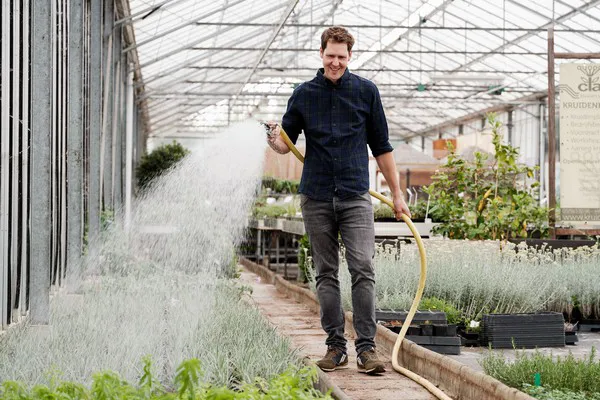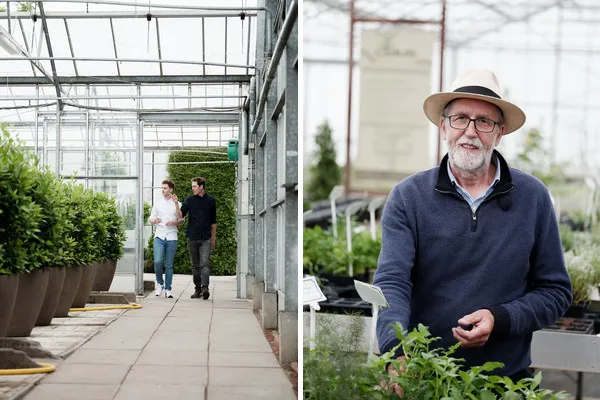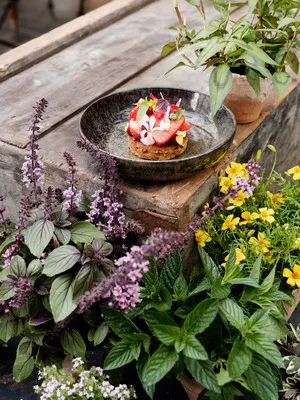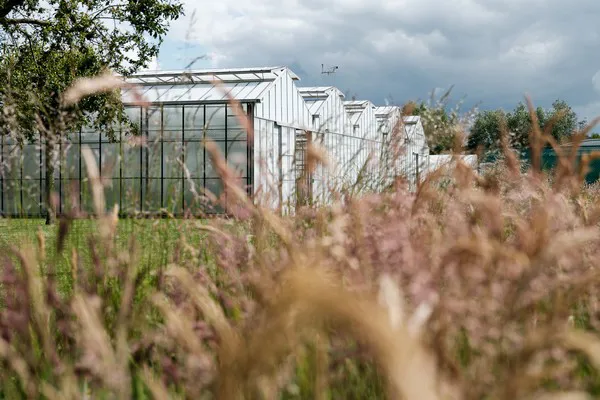It's usually hectic at the Belgian herb farm Kruiden Claus from mid-March in the run-up to Easter. This year, however, the proper pressure is a way off. "I think the weather's the biggest reason," begins Lode Claus of the herb farm specializing in herbs, forgotten vegetables, rare strawberry varieties, and edible flowers. "It's getting a bit busier, but everyone's still restocking. Still, that gives us more room to process all the orders."

Lode Claus
More than a century ago, Lode's great-grandfather established Kruiden Claus, which cultivates roughly 300 different potted herbs. Lode is the family business' fourth generation. It, like many, has gone through a turbulent time. "At the start of the pandemic, our sales, too, plummeted," he admits.
"Normally, we'd still be getting customers, but right around our peak period, everyone had to stay home. The only options people had left for a day out were garden centers. That's a big client share for us, so that benefited us, and we could keep working very well."
COVID and crises
Kruiden Claus thus keeps doing well, despite COVID and other crises. Asked about the post-pandemic situation, the grower mentions its challenges since last year. "Last summer, we had some water shortage issues. We use quite a lot of water. We have large ponds here, but they started drying up. We, thus, had to bring in some water for irrigation. But winter - which corrected the situation - is over now, and there's plenty of water again," explains Lode.

Left, chef Michiel and Lode. Right, Lode's father, Christian Claus.
It was quite a mild winter, too, which did the company good. "We, of course, had heating costs, but we grow planting stock which are quite winter hardy. So, despite how expensive energy was, our bills were manageable. However, in recent years we've started with some more exotic species, like ginger and turmeric. We begin in the spring when the weather's a little better. This year's nice weather took a while to arrive, so we did have to heat a bit extra, but the frost seems to be over now," says Claus.
Van peak to continual pressure
The lovely spring weather has somewhat delayed the company's true peak pressure. "Everything's still starting up, and that's undeniably down to the weather. Though, the peaks are also shifting a bit in general. Those used to be absolutely clear, with February 1 to mid-July being the busiest period. Nowadays, that rush is constant. It still gets hectic during the traditional peak time, but our assortment now includes perennials. These are gaining increasing popularity as, say, ornamental gardens."
"We supply the tree nurseries, too,  an active sector in the fall. They still, as is traditional in Belgium, plant then to get a head start in the spring, which is why we're increasingly busy in the fall. It keeps you busy," Lode laughs.
an active sector in the fall. They still, as is traditional in Belgium, plant then to get a head start in the spring, which is why we're increasingly busy in the fall. It keeps you busy," Lode laughs.
Search for novelties
The nursery's - which give companies tours, too - top sellers remain the classics like basil, rosemary, thyme, and parsley, but Lode sees more people wanting more special varieties.
"That's often related to chefs who are usually the first to want to introduce unusual herbs. They incorporate them into recipes, after which, through TV coverage, for example, it becomes known. The general public then starts using those herbs too."
"That happens a lot lately. It's also because people don't always know what to do with unfamiliar herbs. They need information before they start using it, but once discovered, you can have a lot of fun with varieties like lemon or orange thyme. Another example is saline herbs, like oyster leaf, which are becoming more and more popular. A restaurant began using this a few years ago, and home cooks have since picked up on that. That's nice to see," Lode continues.
Pop-up restaurant and fourth book
One way Kruiden Claus responds to this is via a new book. Lode and his father, Christian, have already written a trio of books on herb growing, but last fall, their 4th book, 'Kruiden kweken koken' (Herbs: Growing, Cooking), was released. "The first three books focused mainly on growing herbs; this one goes into both growing and cooking."
"We worked with a chef, who set to work creating new recipes using the herbs. These are the star of those dishes, elevating them rather than just being an addition," says the grower. "That proved to be innovative in the industry. It gives people the information and tools to start growing and using that herb in the kitchen. Plus, it's an ideal way for chefs to get inspiration."

There will also be a local pop-up restaurant in the summer. Not at Lode's nursery but at a picking farm nearby. "That idea sprung from the book. The initiative, called 'Dinner with the Queen', is all about bees' value. It's a gourmet dinner amidst the fields, where the chef, with whom we've collaborated, prepares the meals. We then share information and experience about the herbs. These are great ways to introduce people to as many different varieties as possible while encouraging herb consumption," Lode concludes.
For more information: Lode Claus
Lode Claus
Kruiden Claus
1 Beer Street
9770, Kruishoutem, BE
Tel: +32 (0) 498 106 733
Email: info@kruidenclaus.be
Website: www.kruidenclaus.be
